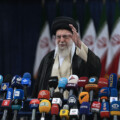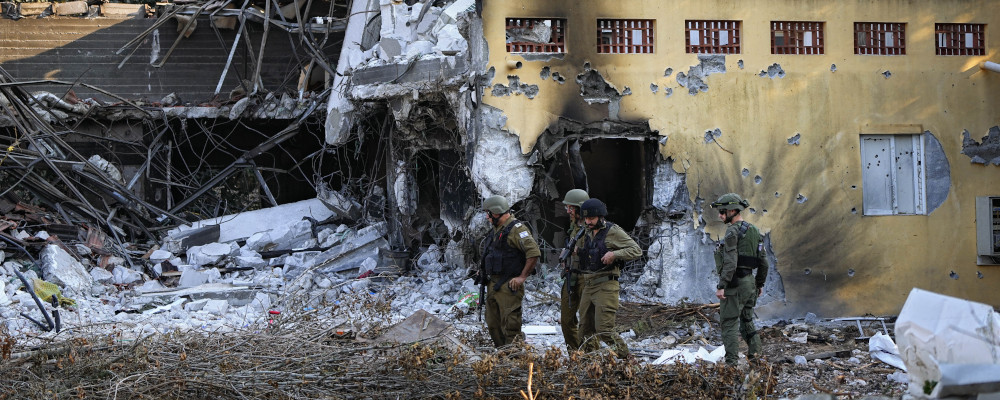Imagine the following. It’s a cool autumn night in October on the U.S. southern border with Mexico. The usual small groups of migrants are picking their way north through dry riverbeds and mesquite along the outskirts of Ciudad Juárez towards El Paso, Texas.
Suddenly, seemingly out of nowhere, gangs of masked men in the thousands on motorcycles and trucks equipped with machine guns, rocket launchers and explosives rush out of the streets of Juárez to and through the border fence. They quickly overwhelm lightly armed U.S. border patrol officers.
That night and the following days La Línea, the ultra-violent military wing of the Juárez Cartel, rampage through El Paso killing local law enforcement and engaging in the wholesale slaughter of thousands of Americans. Women, children and the elderly are kidnapped and taken back across the border into Juárez, a city of a million and a half people, and secreted in the dense, warren-like slums of Delicias and Babicora Sur. The cartels continue to launch rocket attacks on El Paso, hinder the evacuation of civilians from Juárez and refuse to negotiate over the return of hostages.
It is clarifying to ponder how mainstream media might react to a proportional horror perpetrated on America as that experienced recently by Israel. Would we see a rush to judgment, just hours after the largest terrorist attack in U.S. history, to call its cartel perpetrators “militants”? As the president and joint chiefs planned America’s overwhelming military response would our curated news feeds be flooded with experts cautioning the response be “proportional” and urging negotiation with the cartels before resorting to armed force? When the 1st Marine Division began to prepare the battlespace in Juarez with sustained ariel assaults, would news outlets report, with utter credulity, civilian casualty numbers compiled by the cartels themselves? And would NGOs and the United Nations take to the airwaves unchallenged to blame America for the refugee crisis unfolding in Juárez while the cartels actively prevent the civilian evacuation?
The answer is no. Yet here we find ourselves, a week after the worst massacre of Jews since the Holocaust, engaged in a bizarre contest of equivalency when it comes to much of mainstream media’s reporting on the war and the respective actions of Israel and Hamas.
Supposedly world-class broadcasters like the BBC and CBC continue to double down on calling Hamas terrorists “militants” seemingly oblivious to the very definition of the word and the implied legitimacy it conveys when one describes persons who perpetrated crimes against humanity as “engaged in warfare or combat.” To state the obvious, the mass murder of civilians is terrorism, never “warfare or combat” and this moral confusion is a moral stain on those who chose to perpetuate such a fallacy.
The media’s sudden fixation with proportionality as a moral rubric to assess the legitimacy of Israel’s assault on Gaza (and by inference Hamas’ response) should also elicit suspicion. Where for example were media concerns about proportionality when Western armies fought ISIS in Iraq just six years ago? In the Battle of Mosul (2016-2017) upwards of 40,000 civilians were alleged to have been killed by allied bombing and a coordinated ground assault by over a hundred thousand troops. Yet, press reports at the time are devoid of any discussion of the “proportionality” of the Western led military response. It is hard not to conclude that for many in the media a different moral yardstick applies when it is our militaries fighting radical Islamic extremists as opposed to Israel’s.
Similarly too the media’s goalposts for screening disinformation are shifted when Israel is at war. The scoresheet like charts and graphs blaring Israeli and Gazan civilian casualties on websites like The New York Times represent some of the mainstream press’ worst perpetuations of false equivalency. Half of the numbers tallied come, after all, from the Hamas controlled and operated Gaza Health Ministry. Yet, a media that is rightly hyper-attuned to, say, Kremlin falsifications of war casualties reports out public health data from an internationally banned terrorist group running a brutal authoritarian government as unquestioned fact. Again, one is left with the sense of a powerful double standard at work in much of the media’s coverage of the war so far.
These sins of commission are compounded by a grave error of omission. Missing from much of the reporting on this war, to date, is evidence of a basic understanding of the perilous strategic situation Israel finds itself in as a ground invasion of Gaza begins.
Put bluntly, much of the media’s coverage of the conflict assumes that what is unfolding in Gaza is a war of choice for Israel—that viable strategic options not only exist but in fact are preferable for the Jewish state that don’t involve an all-out assault on Gaza. These include everything from rebuilding in the short term its border fence and entering into hostage negotiations with Hamas to restarting lapsed negotiations with the PLO to explore new avenues for a “two state” solution over the long term. These kind of policy mirages, however pleasant and immediately de-escalatory, are based on deeply flawed logic and ignore the reality of the current situation.
The scale of Hamas’ attack, the carnage it wrought and the national trauma it caused, represents arguably the greatest failure of Israeli deterrence since the founding of the Jewish state. Deterrence or the ability to shape and influence the behaviour of your enemies is the sine qua non of sovereignty and doubly so when you live in a neighborhood as dangerous as the one Israel inhabits. Put simply, the state of Israel will not survive unless it can re-establish credible deterrence with its enemies. Logically, this can only be brought about by a complete strategic defeat of the entity that caused Israel’s current crisis of deterrence or Hamas.
Other nation states understand the importance of credible deterrence and it is the major reason for the full-throated support for Israel from great powers like the U.S., France and U.K. They know that in a similar situation (for example, my cartel counterfactual) there is no other option for a sovereign power but to reestablish, as quickly as possible, credible deterrence.

This cold calculus isn’t nice. It is especially cruel to the civilians now caught up in the war. It cannot and will not indemnify the IDF for any war crimes committed in its pursuit of the destruction of Hamas. But it does establish that this is a war of necessity for Israel and needs to be understood as such.
The moral calculus of wars of necessity are inherently different (think, for example, the Second World War). They represent moments in history where false equivalencies are laid bare. The mainstream press needs to acknowledge this and get on with covering the war accordingly.
Hamas is a terrorist group, full stop. Proportionality isn’t a particularly helpful metric to assess right and wrong in a war of necessity against evil. All participants’ claims must be subject to rigorous verification and vigorous disinformation screening. Benefit of the doubt should be given to the truthfulness of democratic governments over authoritarian, terrorist regimes. Israel is not invading Gaza out of choice. And, most important of all, Hamas is singularly responsible for this war and ultimately all its attendant suffering by Jews and Palestinians.
Recommended for You

Michael Bonner: Are we witnessing the last gasp of Iran’s Islamic Republic?

Need to Know: Yahoo, Alberta! You’re doing something right

‘He’s a master of globalization in a re-nationalizing world’: Michael Ignatieff on the domestic and geopolitical challenges facing Prime Minister Carney

‘You have to meet bullying with counter-bullying’: David Frum on how Canada can push back against Trump’s trade negotiation tactics




